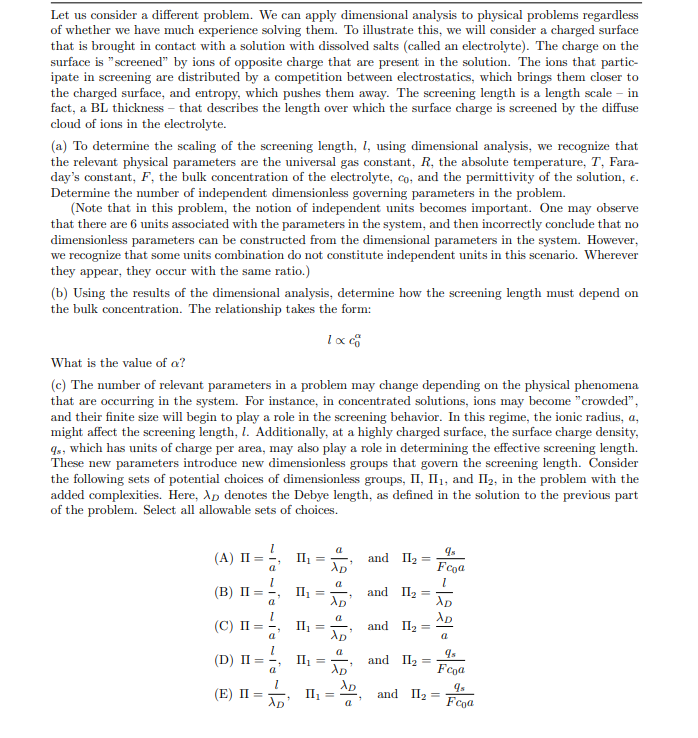
Let us consider a different problem. We can apply dimensional analysis to physical problems regardless of whether we have much experience solving them. To illustrate this, we will consider a charged surface that is brought in contact with a solution with dissolved salts (called an electrolyte). The charge on the surface is "screened" by ions of opposite charge that are present in the solution. The ions that participate in screening are distributed by a competition between electrostatics, which brings them closer to the charged surface, and entropy, which pushes them away. The screening length is a length scale - in fact, a BL thickness - that describes the length over which the surface charge is screened by the diffuse cloud of ions in the electrolyte. (a) To determine the scaling of the screening length, l, using dimensional analysis, we recognize that the relevant physical parameters are the universal gas constant, R, the absolute temperature, T, Faraday's constant, F, the bulk concentration of the electrolyte, c0, and the permittivity of the solution, . Determine the number of independent dimensionless governing parameters in the problem. (Note that in this problem, the notion of independent units becomes important. One may observe that there are 6 units associated with the parameters in the system, and then incorrectly conclude that no dimensionless parameters can be constructed from the dimensional parameters in the system. However, we recognize that some units combination do not constitute independent units in this scenario. Wherever they appear, they occur with the same ratio.) (b) Using the results of the dimensional analysis, determine how the screening length must depend on the bulk concentration. The relationship takes the form: lc0 What is the value of ? (c) The number of relevant parameters in a problem may change depending on the physical phenomena that are occurring in the system. For instance, in concentrated solutions, ions may become "crowded", and their finite size will begin to play a role in the screening behavior. In this regime, the ionic radius, a, might affect the screening length, l. Additionally, at a highly charged surface, the surface charge density, qs, which has units of charge per area, may also play a role in determining the effective screening length. These new parameters introduce new dimensionless groups that govern the screening length. Consider the following sets of potential choices of dimensionless groups, ,1, and 2, in the problem with the added complexities. Here, D denotes the Debye length, as defined in the solution to the previous part of the problem. Select all allowable sets of choices. (A) =al,1=Da, and 2=Fc0aqs (B) =al,1=Da, and 2=Dl (C) =al,1=Da, and 2=aD (D) =al,1=Da, and 2=Fc0aqs (E) =Dl,1=aD, and 2=Fc0aqs







